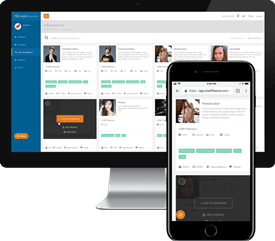Daniela Titiun is a certified Tea Sommelier, fashion lover, crafter and travel addict. Daniela’s background is in business and fashion, but she’s always had a thing for tea. What started as a preference turned into a passion and she created a website called Tea Cachai, which features tea reviews, education, recipes and recommended products. Daniela’s work has been featured in The Strategist, Boston Magazine, World Tea News and Mint Lounge. Check out Tea Cachai to learn more and follow Daniela on Facebook, Instagram, Pinterest and Twitter!
Can you tell us a little bit about your background, including your journey to becoming a Tea Sommelier?
It’s funny because my background has nothing to do with tea. I have a business degree and a fashion degree, and my professional career has been developed in working as a buyer and product manager for fashion and sportswear companies, so nothing to do with that. I’ve always been passionate about tea.
Since I was young, people around me mostly drank coffee, but I was always the only one who went for tea and this kind of love for tea became a passion. At some point, I knew that I wanted to pursue it and go deeper with it, and I knew that I needed to know more about it and explore more so that was it.
What’s the process like to become certified [as a Tea Sommelier]?
It’s kind of a conflicting topic because there are so many organizations that offer the tea sommelier certification and there’s not really consistency in a lot of them. Some are better than others, but there’s this thing that some of them have more prestige than others. In order to become a certified tea sommelier, I had to do a course that had over eight modules and blind tasting. You have the teas in front of you, you didn’t know what it was and there were different types of teas and you had to guess them all and figure them out. That was like the final, final test as well as knowledge about tea.
Also, the thing is that I know so many people that are tea experts or are really, really knowledgeable about tea and they don’t have those certifications. It’s kind of you need it for a few things. You might need it, you might not need it. Most of the people that I know that are extremely knowledgeable, they don’t have the certification. It’s kind of a thing that you get for your own benefit really.
I watched a video from an individual who put this “sleep hack” together and it consisted of herbal tea, apple cider vinegar, and a tablespoon of honey. Do you have any recommendations when it comes to relaxation or sleep [using tea as an aid]?
The first thing that I’m going to say is that the apple cider thing, there’s no scientific, I mean that’s not my expertise, but there’s no scientific backup that says it promotes sleep. There’s just more anecdotal information about some people get to sleep better with apple cider, some others get the complete opposite effect. Leaving the apple cider aside, I’m going to tell you about tea and herbal tea.

There’s a distinction over there that we always like to make. Tea only comes from one plant, which is Camellia sinensis, not getting too geeky and too deep into it. There are only five types of tea. You probably heard of most of these, it’s black tea, oolong, pu’erh, yellow tea, green tea and white tea. I’m sorry, I said five, it’s six. Okay? Those are the six types of tea.
Everything that’s not from the Camellia sinensis plant or not from those six types of teas is herbal tea. Okay? Everything, camomile, your mint, your passionflower, your sleepy teas, all of those are herbs. With herbal teas, they are different than tea itself because they have properties. They can have health benefits as well. Some have properties or health benefits for certain things. Other help promote sleep. Some are adaptogens and so on. If you want to do something to sleep or drink something that will promote sleep, there are certain herbs that you can go for.
A lot of times, you will see in the grocery store or a specialty store sleepy teas. Most of the times, they will have something like lemon balm, lavender, chamomile, valerian is a good one, sort of those kind of things. It’s a different thing than tea itself, which is my specialty.
This next question is for my producer, he’s into tea. He actually introduced me to Lapsang Souchong tea. As a whisky (scotch) drinker, I really appreciate the smoky flavor from it. I love it. His question for you was he really likes Antu Valley Estate Tea and he’s having trouble finding it. Do you know of any place he could look?
Oh wow. That’s very refined and very specific. Actually Antu Valley is in Nepal and that is a Nepalese tea. Their characteristics are very similar to teas from Darjeeling, India. They can be very floral and fragrant and so on. When you have a specific tea from an estate like that, specifically you would have to go to specialty retailers. I often go online to some tea shops that sell and specialize in Nepalese and Indian teas.
Yes. Jon is very refined, that describes him well. Definitely. For those whose experience with tea is limited to the boxes they purchase in the supermarket, what are they missing out on and how can they elevate their tea drinking experience? What are the next few steps they should take? I’m going to guess they should head over to Tea Cachai, right?
Oh yeah, definitely. I love getting people into tea and kind of deeper into it. What I usually say is I compare tea and wine a lot. They have so many similarities in the sense that there’s no such thing as just red tea, right? You have different types of red tea from different regions and so on.

Tea is the same thing. There’s no such thing as black tea. You have black tea from Nepal, from India, from China, Japan, Taiwan, many different places. Basically saying that you get tea from a box from the grocery store is like saying you’re going to get a boxed wine with absolutely no depth, no notes, no complexity. That’s kind of the parallel that I would like to say.
Some people don’t know a lot of loose leaf tea, and then some people are kind of afraid to get into it, but actually it is very simple. It’s hassle-free. The quality that you will get from a tea which is loose leaf is, almost all the time, much better than a teabag. Actually a lot of teabags from mass market consumption are made from the dust that’s collected from the tea factories.
When they make the premium teas, then they collect all these dust and then they put it in bags and that’s what people end up drinking. Definitely go for loose-leaf, I’m happy to help. I love bringing in people to tea, that’s kind of my thing.
What are some of your goals as it pertains to Tea Cachai for 2021 and beyond?
I think following that last question is kind of onto the same thread, I really like getting people into tea. The thing is tea is such a passionate thing. For us tea lovers, we love bringing people into tea because it’s something that you can share with friends and family and other tea drinkers.
The tea drinking community online is also very active and [it includes] great people all over. What I like to do is bring in people closer to tea. That’s something that I do in my blog by creating recipes with tea and kind of showing how it can be accessible for many people, and hopefully more people will start looking for more quality tea.

Andrew is the Head of Client Services for Intellifluence and has a background in communications. He is committed to helping brands get the most out of their campaigns and is the co-host of the Influencer Spotlight series.





